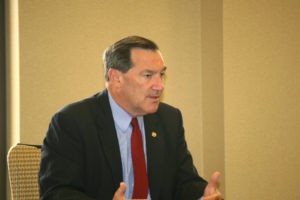The U.S. Senate appears to be gearing up for another health care vote, with a measure from Sens. Bill Cassidy (R-LA) and Lindsey Graham (R-SC) headed to the floor as soon as the middle of next week.
At its core, the Graham-Cassidy proposal creates a block grant program, taking much of the funding provided in the Affordable Care Act (ACA) and sending it to the states for them to set up their own health care systems and determine where to direct the funds.
 It also does away with several pillars of the ACA, including the mandate for individuals to have insurance or pay a penalty. The true ramifications of that are uncertain, but could mean higher premiums for those in the health care exchanges (aka those who don’t have insurance through their workplace).
It also does away with several pillars of the ACA, including the mandate for individuals to have insurance or pay a penalty. The true ramifications of that are uncertain, but could mean higher premiums for those in the health care exchanges (aka those who don’t have insurance through their workplace).
From the standpoint of employers, the Indiana Chamber believes Graham-Cassidy is an improvement over the ACA. This is primarily due to two changes:
- The removal of the employer mandate to offer coverage. If that goes away, so too does the ACA’s definition of a full-time employee as someone working an average of 30 hours per week; this has negatively impacted businesses and workers – many of whom saw their hours reduced.
- The permanent elimination of the medical device tax, which is detrimental to vital Hoosier employers like Cook Medical in Bloomington, Zimmer Biomet in Warsaw and many others.
Overall, those in favor of increased state control are more receptive to the Graham-Cassidy effort.
As Vice President Mike Pence put it on Fox News yesterday: “…The question that people ought to ask is, who do you think will be more responsive to the health care needs in your community? Your Governor and your state legislator, or a congressman and a President far off in the nation’s capital?…”
What has opponents worked up is two-fold: affordable coverage for pre-existing conditions isn’t specifically guaranteed; and population size will determine the amount of the block grant, which will reduce funding for a number of states – including some in the Rust Belt and more rural states in general.
Republican Sen. Jeff Flake of Arizona told MSNBC on Thursday he has absolute faith that governors will keep pre-existing condition protections, because of the severe political cost if they don’t. Opponents are less convinced.
At this point, Kentucky Sen. Rand Paul is the lone Republican who has sworn opposition to the Graham-Cassidy bill publicly – in part because his state appears to be set to lose funds in this model.
Likewise, Indiana is expected to see less federal dollars, but the Hoosier state has been preparing for what it saw as an eventuality for several years – setting aside hundreds of millions of dollars to subsidize its Healthy Indiana Plan (HIP) 2.0.
The HIP model is unique in the country; it requires participants to have “skin in the game” with their health care decisions and allows for capping the number of participants. Both of these make it an inherently more nimble program. And ultimately, the state Legislature can also determine to put more funds into HIP 2.0, if it’s deemed necessary.
These facts and the lure of more state control were likely factors in Gov. Eric Holcomb’s decision to sign a letter supporting Graham-Cassidy; he was one of 15 state executives to do so. The reality is other states may not be as fiscally prepared for a possible funding reduction as Indiana is.
That leads us to who may end up being the pivotal figure in the floor vote: Sen. Lisa Murkowski of Alaska. She joined Sen. Susan Collins (Maine) and Sen. John McCain (Arizona) in voting no on the last health care reform measure. Collins is seen as a likely “no” again, joining Paul, while McCain is a predicted (or at least hoped for) “yes.”
As a result, the bill authors are pulling out all the stops and making special accommodations for Alaska in the bill to woo Murkowski’s vote – because they can’t lose her and have the bill survive for Vice President Pence to break the tie. If no specific provisions for Alaska are made, the state would be a big loser in the bill in funding because of its size vs. population and geography.
The Indiana Chamber plans to talk about health care reform with Sen. Joe Donnelly, who has announced his opposition to Graham-Cassidy, and Republican Sen. Todd Young during Wednesday’s D.C. Fly-in event.
UPDATE: This afternoon, McCain announced he would oppose the Graham-Cassidy bill, making passage of the bill seemingly very difficult.
 In the Indiana General Assembly, both House Bill 1002 and Senate Bill 50 have been significantly amended in ways that we support, but also in ways that give us some concern. We have strong support for the thoughtful and deliberate work on the study by the Legislative Service Agency of all workforce programs. It is extremely thorough and we look forward to the results of each year’s report and presentation. We also support the language regarding the Next Level Jobs Employer Training Grant program. The career and technical education (CTE) student information portal for local employers is a prime example of a creative model without having to spend extra capital. And we also support expanding the Employment Aid Readiness Network (EARN) Indiana program to include part-time students.
In the Indiana General Assembly, both House Bill 1002 and Senate Bill 50 have been significantly amended in ways that we support, but also in ways that give us some concern. We have strong support for the thoughtful and deliberate work on the study by the Legislative Service Agency of all workforce programs. It is extremely thorough and we look forward to the results of each year’s report and presentation. We also support the language regarding the Next Level Jobs Employer Training Grant program. The career and technical education (CTE) student information portal for local employers is a prime example of a creative model without having to spend extra capital. And we also support expanding the Employment Aid Readiness Network (EARN) Indiana program to include part-time students.



 It also does away with several pillars of the ACA, including the mandate for individuals to have insurance or pay a penalty. The true ramifications of that are uncertain, but could mean higher premiums for those in the health care exchanges (aka those who don’t have insurance through their workplace).
It also does away with several pillars of the ACA, including the mandate for individuals to have insurance or pay a penalty. The true ramifications of that are uncertain, but could mean higher premiums for those in the health care exchanges (aka those who don’t have insurance through their workplace).
 The Indiana Chamber has been strongly encouraging our state government leaders to take bold action to address Indiana’s current and future workforce needs – a significant concern for many of our members.
The Indiana Chamber has been strongly encouraging our state government leaders to take bold action to address Indiana’s current and future workforce needs – a significant concern for many of our members. Separately, the Graduation Pathways Panel has already completed two of its eight meetings scheduled before November 1, 2017. As background, the panel was developed as a part of House Bill 1003, which created the new statewide assessment platform to replace ISTEP, now called ILEARN. In addition to installing a new test, the law introduces the idea of pathways for graduation, or other opportunities for students to graduate besides passage of an end-of-course assessment. The law suggests that pathways MAY include options like passing the SAT/ACT or ASVAB (Armed Services Vocational Aptitude Battery); earning an industry certification; earning AP, dual credit or International Baccalaureate credits; or any other pathway as determined by the panel.
Separately, the Graduation Pathways Panel has already completed two of its eight meetings scheduled before November 1, 2017. As background, the panel was developed as a part of House Bill 1003, which created the new statewide assessment platform to replace ISTEP, now called ILEARN. In addition to installing a new test, the law introduces the idea of pathways for graduation, or other opportunities for students to graduate besides passage of an end-of-course assessment. The law suggests that pathways MAY include options like passing the SAT/ACT or ASVAB (Armed Services Vocational Aptitude Battery); earning an industry certification; earning AP, dual credit or International Baccalaureate credits; or any other pathway as determined by the panel.
 It’s been a busy week for Republicans wanting to challenge Sen. Joe Donnelly for his seat. The number now stands at six.
It’s been a busy week for Republicans wanting to challenge Sen. Joe Donnelly for his seat. The number now stands at six.